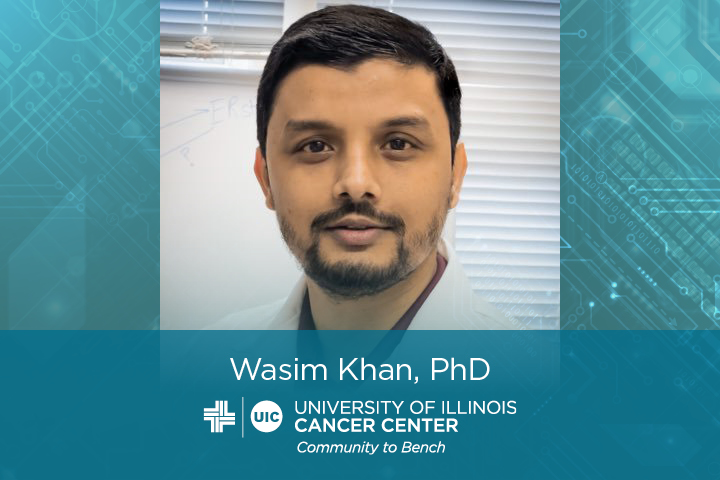
Wasim Khan is attempting to do for others what he couldn’t do for his grandmother, aunt and uncle: help them survive cancer.
“Cancer has been harsh to my family,” said Khan, PhD, a new member of the University of Illinois Cancer Center and visiting scholar in the University of Illinois College of Medicine’s Division of Endocrinology, Diabetes & Metabolism. “I knew early in my life that I wanted to pursue a career in science, and that drove me to become the first member in my extended family to graduate from college.”
While working towards a Master of Science degree in Biochemistry at Aligarh Muslim University in his native India, where he also earned a Bachelor of Science degree in Biochemistry and later a Doctor of Philosophy degree in the same subject, Khan’s research focused on basic metabolism. During his first postdoctoral fellowship, that work expanded into cancer metabolism, specifically in the liver.
Causing more than 700,000 deaths each year, liver cancer is the fourth leading cause of cancer casualties each year. A key factor in liver disease, which can eventually lead to liver cancer, is obesity, a condition involving an excess of body fat that affects one in three Americans. Among the many forms of liver disease is non-alcoholic steatohepatitis (NASH), an inflammation and damage caused by fat buildup, and cirrhosis, where healthy tissue is replaced by scarring causing the organ to work improperly. Recent studies suggest that obesity and liver disease increases the risk of liver cancer, but it is not known how. That’s what Khan is trying to determine through his research.
“We have identified that a novel protein called HKDC1, a hexokinase isoform that is involved in glucose metabolism, contributes in the advancement of both liver disease and liver cancer,” Khan said. “We believe this may be the missing link in our current understanding of the complexities of these diseases. We hope the HKDC1 gene can be targeted for the diagnosis, intervention and treatment of cancer.”
Khan has also found that HKDC1 interacts with mitochondria, often referred to as the powerhouses of the cell that helps turn the energy from food into energy the cell uses, which plays an important role in the progression of NASH and hepatocellular carcinoma (HCC), the most prevalent form of liver cancer.
“We hypothesize that HKDC1 interaction with the mitochondria is essential for its role in disease progression. In order to improve pre-existing therapies and to further develop novel strategies to treat NASH and HCC, we need to understand the exact molecular mechanisms by which HKDC1 promotes the progression of these diseased conditions,” said Khan, whose latest work is being funded through a U.S. Department of Defense grant and the University of Illinois College of Medicine’s Division of Endocrinology.
“I’m looking forward to becoming a member of the University of Illinois Cancer Center, as there are exceptional researchers to learn from. Cancer intervention and treatment is a global crisis and has always been a challenge for the scientific and medical community. I want to help find a cure for liver cancer.”
